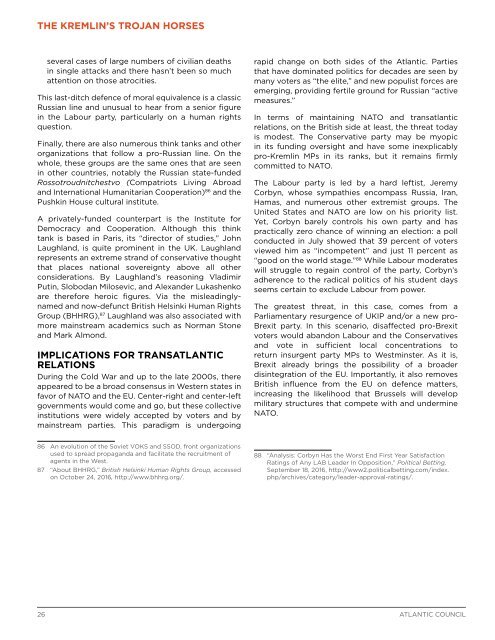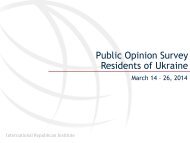You also want an ePaper? Increase the reach of your titles
YUMPU automatically turns print PDFs into web optimized ePapers that Google loves.
THE <strong>KREMLIN’S</strong> <strong>TROJAN</strong> <strong>HORSES</strong><br />
several cases of large numbers of civilian deaths<br />
in single attacks and there hasn’t been so much<br />
attention on those atrocities.<br />
This last-ditch defence of moral equivalence is a classic<br />
Russian line and unusual to hear from a senior figure<br />
in the Labour party, particularly on a human rights<br />
question.<br />
Finally, there are also numerous think tanks and other<br />
organizations that follow a pro-Russian line. On the<br />
whole, these groups are the same ones that are seen<br />
in other countries, notably the Russian state-funded<br />
Rossotroudnitchestvo (Compatriots Living Abroad<br />
and International Humanitarian Cooperation) 86 and the<br />
Pushkin House cultural institute.<br />
A privately-funded counterpart is the Institute for<br />
Democracy and Cooperation. Although this think<br />
tank is based in Paris, its “director of studies,” John<br />
Laughland, is quite prominent in the UK. Laughland<br />
represents an extreme strand of conservative thought<br />
that places national sovereignty above all other<br />
considerations. By Laughland’s reasoning Vladimir<br />
Putin, Slobodan Milosevic, and Alexander Lukashenko<br />
are therefore heroic figures. Via the misleadinglynamed<br />
and now-defunct British Helsinki Human Rights<br />
Group (BHHRG), 87 Laughland was also associated with<br />
more mainstream academics such as Norman Stone<br />
and Mark Almond.<br />
IMPLICATIONS FOR TRANSATLANTIC<br />
RELATIONS<br />
During the Cold War and up to the late 2000s, there<br />
appeared to be a broad consensus in Western states in<br />
favor of NATO and the EU. Center-right and center-left<br />
governments would come and go, but these collective<br />
institutions were widely accepted by voters and by<br />
mainstream parties. This paradigm is undergoing<br />
rapid change on both sides of the Atlantic. Parties<br />
that have dominated politics for decades are seen by<br />
many voters as “the elite,” and new populist forces are<br />
emerging, providing fertile ground for Russian “active<br />
measures.”<br />
In terms of maintaining NATO and transatlantic<br />
relations, on the British side at least, the threat today<br />
is modest. The Conservative party may be myopic<br />
in its funding oversight and have some inexplicably<br />
pro-Kremlin MPs in its ranks, but it remains firmly<br />
committed to NATO.<br />
The Labour party is led by a hard leftist, Jeremy<br />
Corbyn, whose sympathies encompass Russia, Iran,<br />
Hamas, and numerous other extremist groups. The<br />
United States and NATO are low on his priority list.<br />
Yet, Corbyn barely controls his own party and has<br />
practically zero chance of winning an election: a poll<br />
conducted in July showed that 39 percent of voters<br />
viewed him as “incompetent” and just 11 percent as<br />
“good on the world stage.” 88 While Labour moderates<br />
will struggle to regain control of the party, Corbyn’s<br />
adherence to the radical politics of his student days<br />
seems certain to exclude Labour from power.<br />
The greatest threat, in this case, comes from a<br />
Parliamentary resurgence of UKIP and/or a new pro-<br />
Brexit party. In this scenario, disaffected pro-Brexit<br />
voters would abandon Labour and the Conservatives<br />
and vote in sufficient local concentrations to<br />
return insurgent party MPs to Westminster. As it is,<br />
Brexit already brings the possibility of a broader<br />
disintegration of the EU. Importantly, it also removes<br />
British influence from the EU on defence matters,<br />
increasing the likelihood that Brussels will develop<br />
military structures that compete with and undermine<br />
NATO.<br />
86 An evolution of the Soviet VOKS and SSOD, front organizations<br />
used to spread propaganda and facilitate the recruitment of<br />
agents in the West.<br />
87 “About BHHRG,” British Helsinki Human Rights Group, accessed<br />
on October 24, 2016, http://www.bhhrg.org/.<br />
88 “Analysis: Corbyn Has the Worst End First Year Satisfaction<br />
Ratings of Any LAB Leader In Opposition,” Political Betting,<br />
September 18, 2016, http://www2.politicalbetting.com/index.<br />
php/archives/category/leader-approval-ratings/.<br />
26 ATLANTIC COUNCIL



